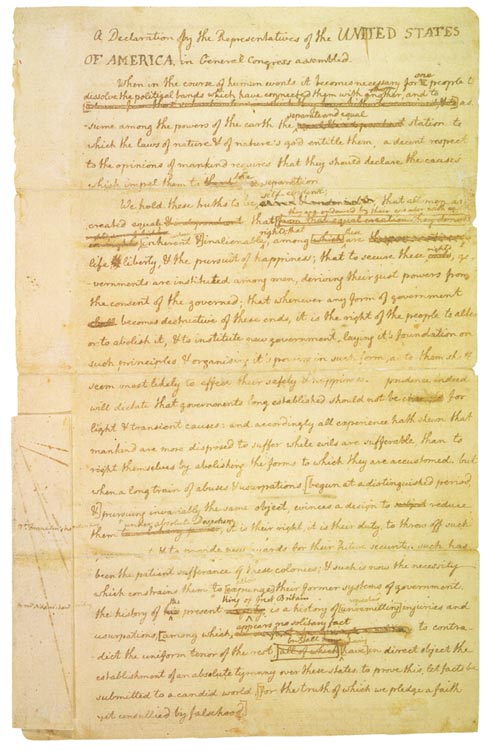
 We’ve all seen copies of the Declaration of Independence, and some of us have seen the real thing at the National Archives in Washington. I doubt any of us, however, have seen the rough drafts that Thomas Jefferson penned in the process of putting together the Declaration that opened a new era in civil government.
We’ve all seen copies of the Declaration of Independence, and some of us have seen the real thing at the National Archives in Washington. I doubt any of us, however, have seen the rough drafts that Thomas Jefferson penned in the process of putting together the Declaration that opened a new era in civil government.
Nevertheless, it’s precisely those early drafts that historians have used to make an inspiring discovery about the crafting of the Declaration, one that adds weight to its revolutionary message.
Using sophisticated new technology, archives analysts have been able to discover that Thomas Jefferson erased the word “subjects” in the early drafts, to replace it with “citizens.” The early drafts of the Declaration have many words marked through, sentences rearranged and grammatical structures amended. Jefferson merely marked through the mistakes on these rough drafts, knowing that they would never make it to the floor of Congress. Nevertheless, there was always a mark on the original rough draft that looked as if Jefferson thoroughly erased a word before replacing it with “citizens.” For decades, indeed for over two centuries, no one knew what the erased word was, save Jefferson himself, until now.
While many in the modern era may quickly dismiss this change in wording from “subjects’ to “citizens,” since the concept of citizenship has been cheapened, it had a profound impact at the time. It was a true philosophical shift from the old world colonial notion that power flowed from the prince to the people, not from the people to the government.
In changing this one word, Jefferson sent a message to the world that in America we believe the rights of man come from God, not government, and that, as a a result, our rights are inalienable. This is truly the essence of America. It is, as the founders called it, “A new order for the ages.” The colonial concept of autocratic government met its opposite in America; we became the first world power in human history to espouse self-government under God.
As we celebrate the adoption of the Declaration of Independence this July 4th, let us remember what it means to be citizens under the Constitution, not subjects to an all-powerful state. There are many challenges to the American Creed in our time, ranging from Supreme Court decisions that grant nearly unlimited taxing power to Congress, to a President who is willing to circumvent Congress to govern by executive order. Nevertheless, the wisdom of our founders, based upon the wisdom of the ages, provided us a way to reform our government and provide new guards for our future security. It is called free and fair elections. As we reflect on this Independence Day, let us resolve secure conservative leadership in the United States Senate and work together to Restore the Republic.
America’s best days can still be before her, if we return to the belief that America’s greatness is her values, and the conviction that those values are rooted in the Judeo-Christian concept of limited government under law.





Citizens v Subjects: A Fresh Look at the Declaration of Independence http://t.co/6qPD4D4FuV
Happy Independence Day! Let’s recommit ourselves to ensuring that “government of the people, by the people, for… http://t.co/lqqwjDloja
RT @Josh_Kimbrell: Citizens v Subjects: A Fresh Look at the Declaration of Independence http://t.co/31RBTNKoyE
I wish Obama was a one term president. 🙁 By the time we get through his 2nd term it will feel like he’s been there longer than FDR.
I’m a damned good citizen; I’d be a lousy subject. http://t.co/7dLKsIDpjr
The changing of the word subject to citizen is crucial to understanding that the revolutionaries and drafters of the Constitution intended to eschew the use of the English law. Some correspondence by the framers shows that they knew about — and possibly use — deVattell’s Law of Nations concepts in the Constitution. In the Law of Nations, the phrase “Natural Born Citizen” is defined. The defnition is a person born on the soil, or native, and having both parents as citizens. Surprised?
RT @Josh_Kimbrell: What Thomas Jefferson completely erased from the Declaration of Independence… and why. http://t.co/6qPD4D4FuV
Citizens v Subjects: A Fresh Look at the Declaration of Independence http://t.co/QFzJoHefl5 via @sharethis
Citizens, not Subjects … http://joshkimbrell.com/?p=1311
http://joshkimbrell.com/?p=1311
Citizens v Subjects: A Fresh Look at the Declaration of Independence http://t.co/FrsDBOY06v via @sharethis